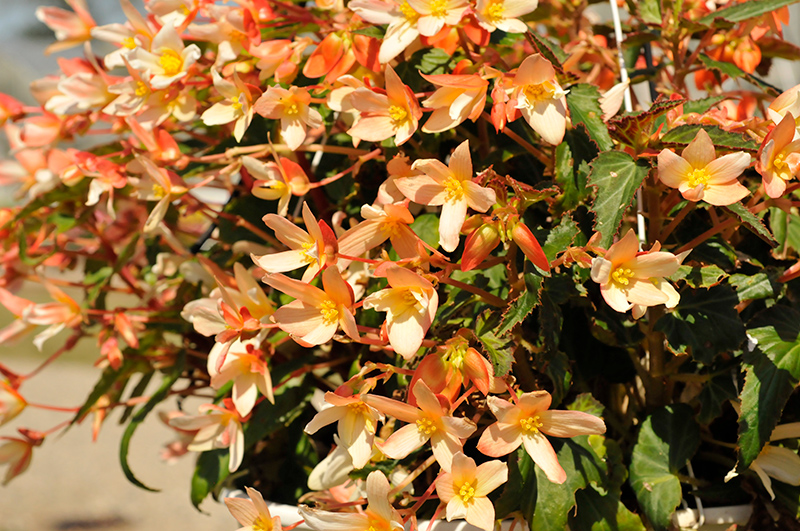Copacabana Tricolor Begonia
Begonia boliviensis 'Copacabana Tricolor'
Plant Height: 6 inches
Flower Height: 12 inches
Spacing: 12 inches
Sunlight:
![]()
![]()
Hardiness Zone: (annual)
Group/Class: Copacabana Series
Brand: Cerny
Description:
Sun tolerant and freeflowering all summer long, a perfect addition to hanging baskets, patio containers and garden beds; beautiful apricot, cream and yellow blooms stand out against green, toothed foliage; deadhead to encourage new blooms
Ornamental Features
Copacabana Tricolor Begonia features dainty nodding double peach bell-shaped flowers with creamy white overtones and yellow centers at the ends of the stems from mid spring to mid fall. Its attractive serrated narrow leaves remain green in color throughout the year.
Landscape Attributes
Copacabana Tricolor Begonia is an herbaceous annual with a trailing habit of growth, eventually spilling over the edges of hanging baskets and containers. Its medium texture blends into the garden, but can always be balanced by a couple of finer or coarser plants for an effective composition.
This is a high maintenance plant that will require regular care and upkeep. Trim off the flower heads after they fade and die to encourage more blooms late into the season. Deer don't particularly care for this plant and will usually leave it alone in favor of tastier treats. Gardeners should be aware of the following characteristic(s) that may warrant special consideration;
- Insects
- Disease
Copacabana Tricolor Begonia is recommended for the following landscape applications;
- Mass Planting
- Border Edging
- General Garden Use
- Container Planting
- Hanging Baskets
Planting & Growing
Copacabana Tricolor Begonia will grow to be only 6 inches tall at maturity extending to 12 inches tall with the flowers, with a spread of 12 inches. When grown in masses or used as a bedding plant, individual plants should be spaced approximately 12 inches apart. Its foliage tends to remain low and dense right to the ground. Although it's not a true annual, this plant can be expected to behave as an annual in our climate if left outdoors over the winter, usually needing replacement the following year. As such, gardeners should take into consideration that it will perform differently than it would in its native habitat.
This plant does best in full sun to partial shade. It requires an evenly moist well-drained soil for optimal growth, but will die in standing water. This plant should not require much in the way of fertilizing once established, although it may appreciate a shot of general-purpose fertilizer from time to time early in the growing season. It is not particular as to soil pH, but grows best in rich soils. It is somewhat tolerant of urban pollution, and will benefit from being planted in a relatively sheltered location. Consider applying a thick mulch around the root zone over the growing season to conserve soil moisture. This is a selected variety of a species not originally from North America. It can be propagated by cuttings; however, as a cultivated variety, be aware that it may be subject to certain restrictions or prohibitions on propagation.
Copacabana Tricolor Begonia is a fine choice for the garden, but it is also a good selection for planting in outdoor containers and hanging baskets. Because of its trailing habit of growth, it is ideally suited for use as a 'spiller' in the 'spiller-thriller-filler' container combination; plant it near the edges where it can spill gracefully over the pot. Note that when growing plants in outdoor containers and baskets, they may require more frequent waterings than they would in the yard or garden.

